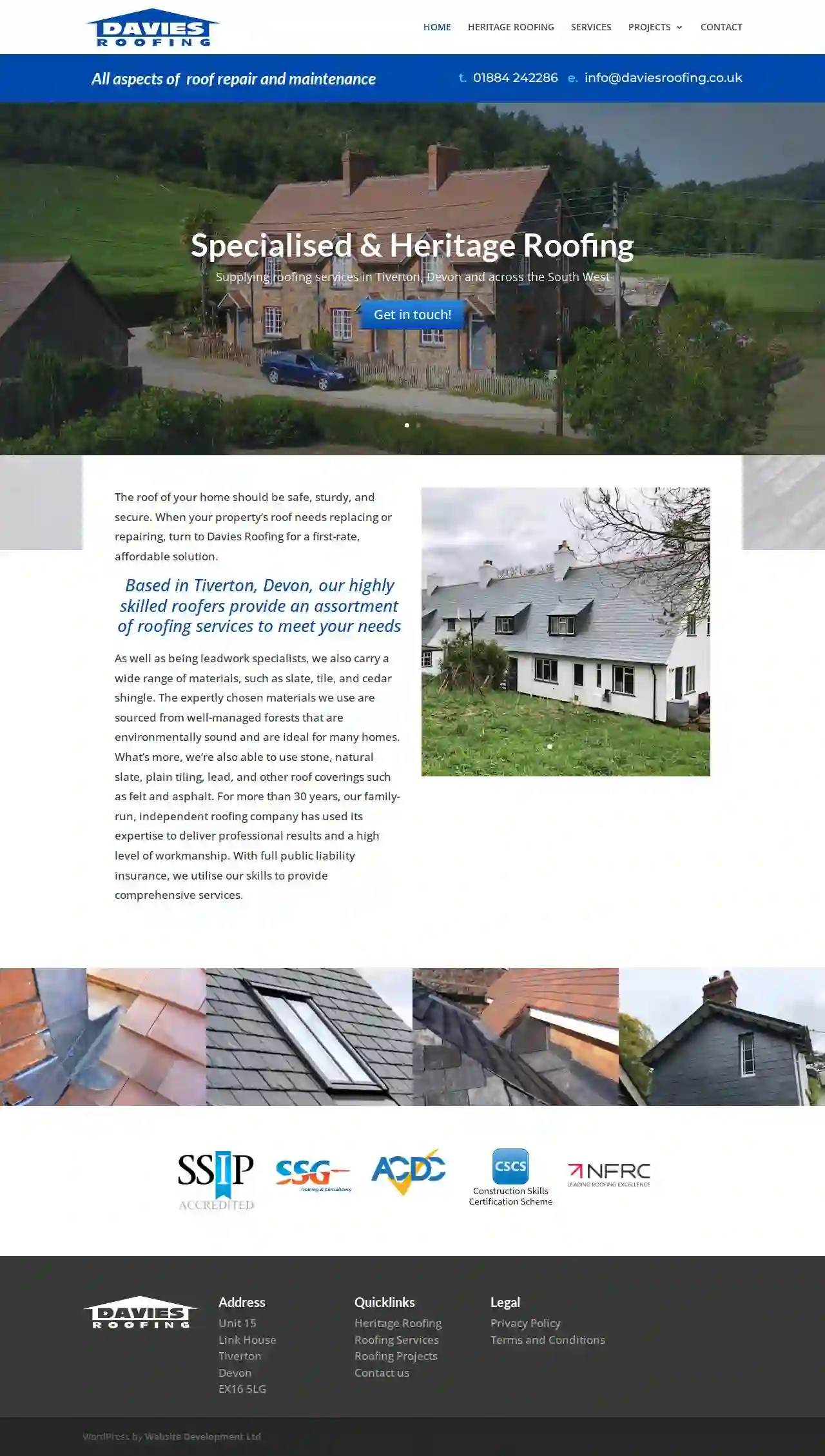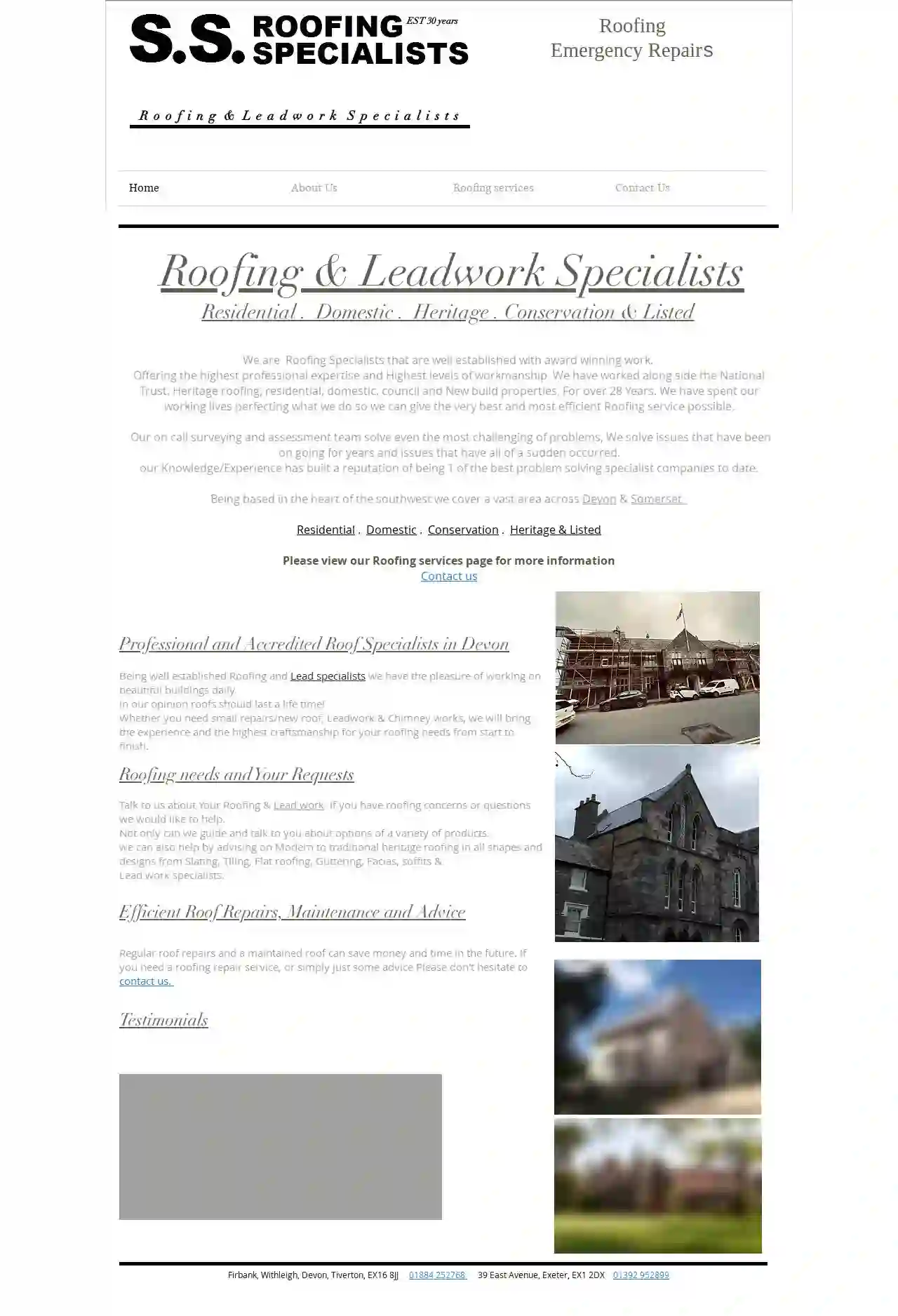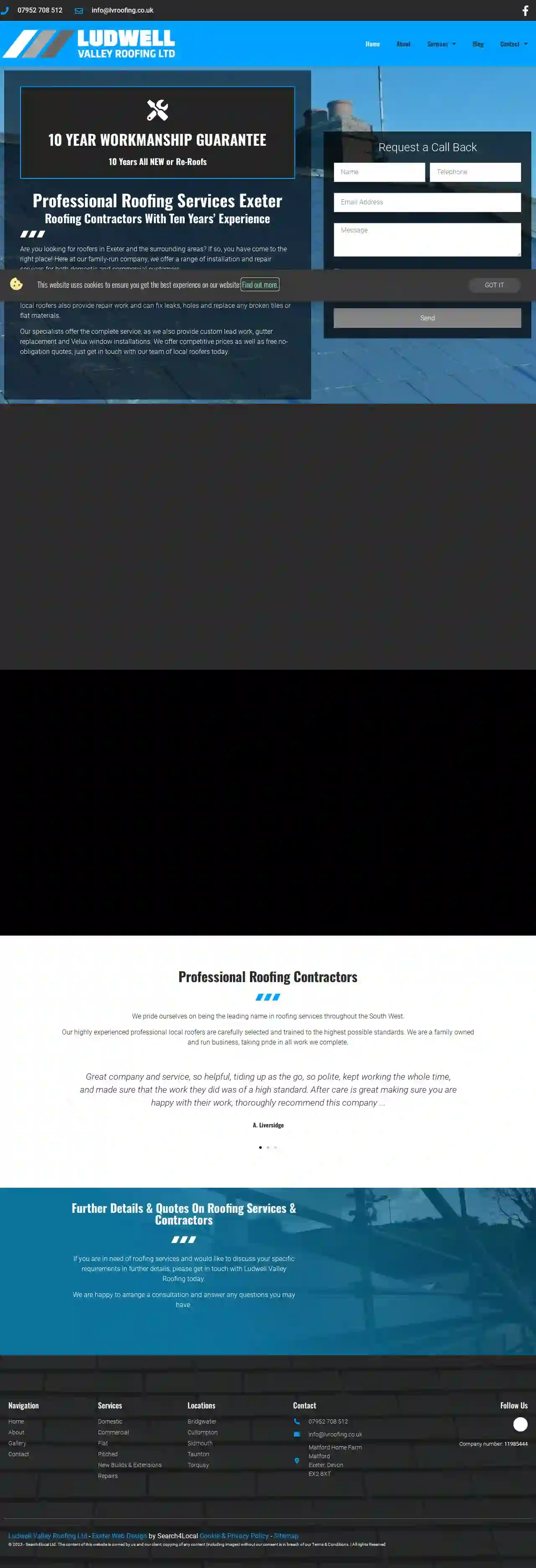Shingle Roofers Abertawe
Top 10 Asphalt Shingle Roofers in Abertawe
Get up to 3 Asphalt Shingle Roofing Contractor quotes for your project today! Compare profiles, reviews, accreditations, portfolio, etc... and choose the best deal.

Gnoll Drive Roofing Contractors
4.331 reviewsGBGnoll Drive Roofing Contractors are an established roofing contractor based in Neath with 30 years of experience. We pride ourselves on providing a specialist and expert service, with good honest workmanship at realistic prices. We offer free estimates and free expert advice on any roofing project at anytime. All work is guaranteed with only the best materials used. We offer a range of roofing and uPVC services including: * Flat Roofs * Fibreglass Roofs * Rubber Roofs * Pitched Roofs * Slate Roofs * Tiled Roofs * Conservatory Roofs * UPVC windows & doors supplied and fitted * UPVC facias, soffits, gutters etc. * Velux windows supplied and fitted * Dormas and Cladding * New bays constructed * Stack removal and pointing All repair work undertaken. We climb to the peak, to cure your leak The quality is still there long after the price has been forgotten
- Services
- Why Us?
- Gallery
Get Quote
Davies Roofing
3.54 reviewsLink House, Unit 15, Tiverton, EX16 5LG, GBAll aspects of roof repair and maintenance. Davies Roofing is a family-run, independent roofing company based in Tiverton, Devon. We have over 30 years of experience in providing professional roofing services to both domestic and commercial clients across the South West. We pride ourselves on our high quality workmanship, competitive prices and excellent customer service. Our team of highly skilled roofers are experts in all aspects of roofing, including slating, tiling, leadwork, flat roofing, and more. We use only the best materials and techniques to ensure that your roof is safe, sturdy, and secure. As a family-owned business, we understand the importance of building strong relationships with our clients. We are committed to providing a personal and professional service that exceeds your expectations. Whether you need a small repair or a complete roof replacement, Davies Roofing is the company to call. We are fully insured and guarantee all of our work. Contact us today for a free quote.
- Services
- Why Us?
- Gallery
Get Quote
SS Roofing Specialists
Firbank, Withleigh, Devon, Tiverton, EX16 8JJ, GBEST 30 years Roofing Emergency Repairs Roofing & Leadwork Specialists HomeAbout UsBlogRoofers In DevonHeritage roofingRoofers in somersetRoofing servicesLead RoofingRe-RoofingHeritage RoofingRoof Repairs/Emergency Roof repairsFlat roofingCedar shinglesChimney worksFascias soffits & gutteringLoft insulationRoofing & Leadworks vacanciesScaffolding HireContact UsMoreUse tab to navigate through the menu items. Roofing & Leadwork Specialists Residential . Domestic . Heritage . Conservation & Listed We are Roofing Specialists that are well established with award winning work. Offering the highest professional expertise and Highest levels of workmanship. We have worked along side the National Trust, Heritage roofing, residential, domestic, council and New build properties, For over 28 Years. We have spent our working lives perfecting what we do so we can give the very best and most efficient Roofing service possible. Our on call surveying and assessment team solve even the most challenging of problems, We solve issues that have been on going for years and issues that have all of a sudden occurred.our Knowledge/Experience has built a reputation of being 1 of the best problem solving specialist companies to date. Being based in the heart of the southwest we cover a vast area across Devon & Somerset Residential . Domestic . Conservation . Heritage & Listed Please view our Roofing services page for more information Contact us Roofing needs and Your Requests Talk to us about Your Roofing & Lead work. If you have roofing concerns or questions we would like to help. Not only can we guide and talk to you about options of a variety of products. we can also help by advising on Modern to traditional heritage roofing in all shapes and designs from Slating, Tiling, Flat roofing, Guttering, Facias, soffits & Lead work specialists. Professional and Accredited Roof Specialists in Devon Being well established Roofing and Lead specialists we have the pleasure of working on beautiful buildings daily. In our opinion roofs should last a life time! Whether you need small repairs/new roof, Leadwork & Chimney works, we will bring the experience and the highest craftsmanship for your roofing needs from start to finish.Efficient Roof Repairs, Maintenance and Advice Regular roof repairs and a maintained roof can save money and time in the future. If you need a roofing repair service, or simply just some advice Please don't hesitate to contact us. Testimonialss s roofing specialists reviewss s roofing specialiststestimonialsRoofers in DevonS S Roofing specialistsRoofers Devon Roofing specialists Devons s roofing specialists reviewss s roofing specialists
- Services
- Why Us?
- Accreditations
- Our Team
- Testimonials
- Gallery
Get Quote
Kendall Roofing
3.37 reviews12 Eastville Rd, Six Bells, NP13 2PB, GBWelcome to Kendall Roofing, your trusted experts in all aspects of roofing services. With our extensive experience and dedicated team, we are here to meet all your roofing needs, from slating and tiling to facias, soffits, guttering, Velux installation, lead fabrication, and flat roofing. At Kendall Roofing, we take great pride in our craftsmanship and attention to detail. Whether you’re a homeowner, business owner, or property developer, we have the expertise and resources to deliver exceptional roofing solutions tailored to your specific requirements. Kendall roofing are a family run business and have been serving the South wales area for over 10 years. All our employees go through NVQ full training and are CSCS registered. We are a professional team who care about our work and value beauty, quality and durability. We bring our experience to your roofing projects at competitive prices along with quality workmanship. In our 10 years of experience we have been certified by CHAS, CITB, Construction Skills and Wales National Roofing Training Group and are proud associates of the Institute Of Roofing.
- Services
- Why Us?
- Accreditations
- Our Team
- Testimonials
- Gallery
Get Quote
D & R Roofing
4.58 reviewsAberdulais, Neath, Tithe Barn, SA10 8HL, GBBASED IN NEATH, ESTABLISHED IN 1995 EXPERTS IN ALL ASPECTS OF DOMESTIC AND COMMERCIAL ROOFING Professional Roofers serving Domestic and Commercial Clients across the west Glamorgan area. D&R Roofing was formed in 1995 and is a professional roofing company based in Neath and operating across the South Wales region. We offer our full range of roofing services to clients from the domestic and commercial sector and are large enough to cope with the largest of projects and often work for large national developers and Local Authorities. Domestic clients will also receive the same excellent level of customer service, attention to detail and exceptionally high standards of workmanship which has become our trademark and is the key factor in us receiving most of our work from word of mouth and personal recommendations from previous clients. We welcome all enquiries and offer free and friendly advice wherever we can, we don’t employ sales staff or use high pressure sales techniques we just offer professional, knowledgeable and honest advice. If you have an enquiry please do not hesitate to contact us and we will be pleased to discuss your requirements. What We Do New Roofs Roof Coverings Tiles & Slating Roof Repairs Chimneys Ridge Tiles Lead Work Fascias & Soffits Guttering Why Choose D&R Roofing? FULLY INSURED FAIR & COMPETITIVE RATES EXCELLENT WORKMANSHIP ALL WORK GUARANTEED FREE SURVEY & QUOTATION DOMESTIC & COMMERCIAL WORK ALL ROOF RREPAIRS & NEW BUILD
- Services
- Why Us?
- Our Team
- Testimonials
- Gallery
Get Quote
Devonshire Roofing Services
4.36 reviewsGBDevon Roofing Network is a group of roofing professionals serving Devon, offering a wide range of residential and commercial roofing services. They specialize in roof repairs, flat roofing, guttering, fascias & soffits, and more. The network emphasizes the importance of a well-built roof and the need for timely repairs to prevent further damage. They provide free quotes and offer various roofing materials, including felt, slate, fiberglass, and EPDM rubber. Devon Roofing Network encourages potential customers to contact them through their website form for a prompt response and a quote.
- Services
- Why Us?
- Gallery
Get Quote
Ludwell Valley Roofing Ltd
51 reviewsMatford, Matford Home Farm, Exeter, EX2 8XT, GBAs roofing contractors in Exeter with many years of experience in the industry, you can rely on us for specialist services at competitive prices! Our team offer a range of installation, maintenance and repair services throughout our local area to residential, commercial and industrial buildings. From flat and pitched roofing to custom lead work, we can offer our skills and expertise for your project. You can rely on our expert contractors to provide a professional standard of work that exceeds all of your expectations. Furthermore, while our standards are high we always keep our prices low. So no matter your budget, we can produce a stunning installation that stands the test of time and keeps your property looking its best! Established since 2018, our roofing company has already become a reputable name across Exeter and the surrounding areas. Run by Ashley and Mike, our independent, family-owned business proudly offers bespoke, personalised services to all of our customers. We are small enough to give a friendly and dedicated approach while being large enough to cope with projects of all sizes and complexities. From homes and flats to schools, offices and warehouses, we can work on all building types. As local roofing specialists, we can provide a range of comprehensive services, including: Flat roofs Pitched roofs Slate and tiles Systems for extensions and loft conversions Installations for new builds Leak repairs Tile replacements Custom lead work Gutter replacements Solar panel installations Velux windows Whether you need a new system for your home, or something has become damaged due to strong weather, we are the team to choose. We offer quick response times, and can visit your property at the most convenient time for you. Furthermore, throughout our time on your property, we always make an active effort to maintain communication every step of the way to ensure your requirements are being met. We are local roofing contractors that are based in Exeter, however we travel across Devon and Somerset, including: Torquay Newton Abbot Paignton Cullompton Sidmouth Taunton Bridgwater Providing top customer service will always be a high priority as we want to leave your property knowing that you are happy with our work! We are thrilled that many of our satisfied customers have left positive reviews over on our Facebook page, so why not take a look to find out more.
- Services
- Why Us?
- Accreditations
- Our Team
- Testimonials
- Gallery
Get Quote
Courtney Roofing Services LTD
Exminster, EX6, GBDevon Roofing Network is a network of roofing professionals serving Exminster and surrounding areas. We offer a wide range of roofing services for both residential and commercial properties, including roof repairs, flat roofing, guttering, fascias & soffits, and more. Our members are experienced and qualified to handle all aspects of roofing, from small repairs to complete roof replacements. We understand the importance of a well-built roof over your head, and we are committed to providing high-quality workmanship and customer service. If you require the services of a roofer in Exminster, please contact us today for a free quote.
- Services
- Why Us?
- Gallery
Get Quote
Redhill Roofing
56 reviews36 St Michaels road, Kingsteignton, TQ12 3AQ, GBRedhill Roofing is a family-run business with a rich history spanning 40 years. Established by Adam's father, the company has been a trusted name in the roofing industry for generations. Adam, who joined the business 26 years ago, carries on the family tradition, ensuring Redhill Roofing remains at the forefront of modern roofing practices. We specialize in all aspects of roofing services, from flat roofs and re-roofing to repairs, valley replacements, fascia and guttering, sun tunnels, skylight installations, and even moss removal and roof cleaning. At Redhill Roofing, we pride ourselves on providing a reliable, efficient, and friendly service. Customer satisfaction is our top priority, and we strive to exceed expectations with our high standards and comprehensive expertise. We use only the best quality materials to ensure long-lasting results. Whether you're in Newton Abbot, Teignmouth, or the surrounding areas, Redhill Roofing is your trusted partner for all your roofing needs. Don't hesitate to get in touch for a free quote and experience the Redhill Roofing difference!
- Services
- Why Us?
- Our Team
- Testimonials
- Gallery
Get Quote
Roofers Cardiff
55 reviewsCardiff, Unit 39448, CF11 1NB, GBRoofers Cardiff is a specialist roofing company that provides services to both residential and commercial properties in Cardiff and the surrounding areas. Our company offers a range of services, including repair, and building of flat roofs, pitched roof repair, gutter repair and lead-work, fascias, soffits, and new build roofing.Our team of expert roofers have extensive experience across the Cardiff region, meaning our skills as a company also include battening, re-felting, tiling and slating. Additionally, our company can also provide PVC fascias and Velux window installation. Call us to get a free roofing quote for your property.Every member of our team works with high professionalism and enthusiasm to offer a reliable and trustworthy service that ensures customer satisfaction. We are your local roofing contractor that provides all types of roofing services and gutter services.
- Services
- Why Us?
- Gallery
Get Quote
Over 12,314+ Roofing Companies registered
Our roofing experts operate in Abertawe and beyond!
Roofyng.co.uk has curated and vetted the Best Roofing Businesses in Abertawe. Find a top & trustworthy business today.
Shingle Roofing FAQs
- Adequate insulation: Ensuring your attic is properly insulated to minimize heat loss from the roof.
- Proper ventilation: Providing adequate attic ventilation to keep the roof deck cold and prevent snow from melting prematurely.
- Air sealing: Sealing any air leaks in your attic to prevent warm air from escaping into the attic space.
- Ice and water shield: Installing a waterproof membrane, called an ice and water shield, along the eaves and valleys of your roof to prevent leaks from ice dams.
- Curling or buckling shingles: When shingles start to curl or buckle, they are nearing the end of their lifespan and may not be effectively protecting your home from the elements.
- Missing or broken shingles: Missing or broken shingles leave your roof vulnerable to leaks.
- Granule loss: Significant granule loss in your gutters indicates that your shingles are losing their protective coating and are more susceptible to damage.
- Leaks or water stains: Any signs of leaks or water stains on your ceiling or walls could be a symptom of roof problems, including damaged shingles.
- Age: If your shingle roof is nearing or exceeding its expected lifespan, it's a good idea to have it inspected by a qualified roofing contractor to assess its condition.
- Class A: The highest fire rating, indicating excellent resistance to external fire exposure. Most asphalt shingles are Class A rated.
- Class B: Offers moderate fire resistance.
- Class C: Provides minimal fire resistance.
Can I install a shingle roof myself?
What are ice dams, and how can I prevent them?
How do I know if my shingle roof needs replacing?
What are the fire ratings for shingles?
Can I install a shingle roof myself?
What are ice dams, and how can I prevent them?
- Adequate insulation: Ensuring your attic is properly insulated to minimize heat loss from the roof.
- Proper ventilation: Providing adequate attic ventilation to keep the roof deck cold and prevent snow from melting prematurely.
- Air sealing: Sealing any air leaks in your attic to prevent warm air from escaping into the attic space.
- Ice and water shield: Installing a waterproof membrane, called an ice and water shield, along the eaves and valleys of your roof to prevent leaks from ice dams.
How do I know if my shingle roof needs replacing?
- Curling or buckling shingles: When shingles start to curl or buckle, they are nearing the end of their lifespan and may not be effectively protecting your home from the elements.
- Missing or broken shingles: Missing or broken shingles leave your roof vulnerable to leaks.
- Granule loss: Significant granule loss in your gutters indicates that your shingles are losing their protective coating and are more susceptible to damage.
- Leaks or water stains: Any signs of leaks or water stains on your ceiling or walls could be a symptom of roof problems, including damaged shingles.
- Age: If your shingle roof is nearing or exceeding its expected lifespan, it's a good idea to have it inspected by a qualified roofing contractor to assess its condition.
What are the fire ratings for shingles?
- Class A: The highest fire rating, indicating excellent resistance to external fire exposure. Most asphalt shingles are Class A rated.
- Class B: Offers moderate fire resistance.
- Class C: Provides minimal fire resistance.